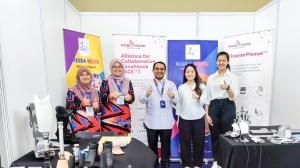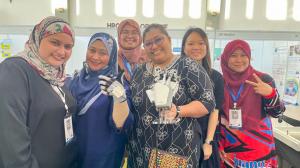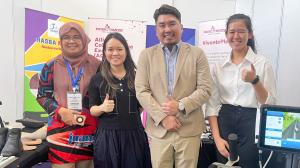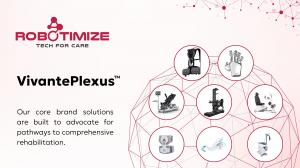Robotimize and Hasba Medik Unite for World Stroke Day Exhibition: Demonstrating Comprehensive Rehabilitation Pathways

Robotimize and Hasba Medik teams unite at Hospital Rehabilitation Cheras for World Stroke Day, demonstrating rehabilitation technologies that create pathways to recovery for stroke survivors.

Healthcare professionals explore HandVivante™ MirrorHand at the Hospital Rehabilitation Cheras World Stroke Day convention.

(Third from left) Even Koh, Group General Manager of Robotimize Group, with Hasba Medik team at World Stroke Day convention
Robotimize and Hasba Medik showcase stroke rehabilitation technologies at World Stroke Day convention in Hospital Rehabilitation Cheras.
World Stroke Day underscores an urgent global reality: every minute, 30 people experience their first stroke. Globally, one in four people will have a stroke in their lifetime. During a stroke, 1.9 million brain cells die every minute. Time is brain—but acting F.A.S.T. (Face drooping, Arm weakness, Speech difficulty, Time to call emergency services) represents only the beginning of stroke care. Effective acute intervention saves lives, yet comprehensive recovery requires coordinated rehabilitation addressing motor function, cognitive abilities, speech, emotional wellbeing, and community reintegration.
Partnership in Action: Hasba Medik and Robotimize at the Frontlines
Commemorating World Stroke Day, the Robotimize team joined trusted partner Hasba Medik at Hospital Rehabilitation Cheras to support their booth and engage with healthcare professionals committed to advancing stroke rehabilitation. Together, the partners demonstrated rehabilitation technologies that create pathways to functional recovery for stroke survivors.
Hasba Medik's evolution from prosthetics and orthotics specialist to rehabilitation robotics partner reflects Malaysia's broader healthcare technology landscape. The company's established relationships with hospitals, rehabilitation centers, and healthcare professionals nationwide—built through years of P&O service excellence—create natural pathways for introducing advanced rehabilitation technologies. This foundation of trust and clinical expertise enables smoother technology adoption, more effective training programs, and sustainable implementation support across diverse healthcare settings.
Our partnership with Hasba Medik demonstrates how distribution relationships built on shared values—patient outcomes, clinical excellence, evidence-based practice—strengthen rehabilitation delivery. Hasba Medik brings decades of prosthetics and orthotics expertise and nationwide healthcare relationships to rehabilitation robotics, ensuring technologies we develop reach stroke survivors effectively and sustainably across Malaysia," said Kerry Guo, Founder and CEO, Robotimize Group.
At Hospital Rehabilitation Cheras, this collaboration manifested through live technology demonstrations, clinical discussions with therapists treating stroke patients daily, and meaningful conversations about implementation challenges and successes. These interactions reinforce the importance of acting F.A.S.T. not only during stroke emergencies but also in supporting comprehensive care throughout the recovery journey.
Beyond Acute Care: Rehabilitation as Recovery Foundation
Stroke rehabilitation addresses multifaceted challenges: motor impairments affecting mobility, arm function, and fine motor control; cognitive changes impacting memory, attention, and executive function; speech and language difficulties; emotional and psychological adjustment; and the ultimate goal of community reintegration and quality of life restoration.
Robotimize's VivantePlexus™ rehabilitation ecosystem provides technologies addressing this spectrum of needs. Systems demonstrated at the Cheras event included upper limb solutions like HandVivante™ MirrorHand for hand rehabilitation and GripVivante™ for functional electrical stimulation; lower limb systems including GaitVivante™ ProMax for gait training; cycling-based rehabilitation through RevitaVivante™ systems; and complementary platforms for cognitive stimulation, balance training, and telerehabilitation.
These technologies share unified data architecture enabling clinicians to personalize therapy pathways, track objective progress across multiple therapeutic modalities, and adjust interventions based on measurable performance trends. For stroke survivors, this integration translates to rehabilitation programs addressing their complete recovery needs rather than isolated impairments.
"Stroke recovery demonstrates why comprehensive rehabilitation requires diverse therapeutic approaches working in concert. Motor recovery, cognitive rehabilitation, speech therapy, psychological support—each contributes to functional independence and quality of life. Technologies that integrate across these domains help clinicians deliver coordinated care that serves patients completely," said Zen Koh, Strategic Advisor, Robotimize Group.
Malaysian Healthcare Context: Collaborative Models for Access
Hospital Rehabilitation Cheras represents Malaysia's commitment to specialized rehabilitation services addressing the growing burden of stroke and other neurological conditions in aging populations. Events like "Beyond the Hospital Walls" strengthen connections between acute care hospitals, rehabilitation facilities, community health services, and family caregivers—recognizing that stroke recovery extends far beyond hospital discharge.
Robotimize's presence at the convention, facilitated through partnership with Hasba Medik, reflects the company's regional commitment. With a hub in Malaysia, Robotimize works closely with local healthcare institutions, understands implementation challenges within Malaysian healthcare systems, provides training and support adapted to local clinical workflows, and builds partnerships with distributors like Hasba Medik who bridge technology innovation with practical accessibility.
"Malaysian healthcare professionals demonstrate remarkable dedication to stroke rehabilitation despite resource constraints and growing patient populations. Our role involves providing technologies that multiply therapist productivity, enable objective outcome measurement, and ultimately expand access to evidence-based rehabilitation. Events like World Stroke Day remind us why this work matters—behind every statistic about stroke prevalence are individuals, families, and communities seeking pathways to recovery," said Even Koh, Group General Manager, Robotimize Group.
Creating Pathways to Recovery: Function, Dignity, Hope, Quality of Life
At Robotimize, comprehensive stroke care means supporting patients at every stage—from acute emergency response through long-term rehabilitation. Creating pathways to recovery that restore not just function, but dignity, hope, and quality of life. The World Stroke Day message—acting F.A.S.T. saves lives—extends naturally to rehabilitation's role: acting comprehensively restores quality of life.
Stroke survivors often face daunting recovery journeys. Motor impairments may prevent walking, using affected arms, performing daily activities independently. Cognitive changes complicate communication, decision-making, social interaction. Emotional impacts include depression, anxiety, identity shifts. Effective rehabilitation addresses all these dimensions through coordinated, evidence-based interventions delivered by skilled therapists supported by appropriate technologies.
The technologies demonstrated at Cheras don't replace therapists—they empower clinical teams to deliver more intensive, personalized, measurable therapy than manual techniques alone permit. Robotic systems provide consistent assistance and objective performance data. Electrical stimulation helps retrain movement patterns. Cognitive platforms deliver engaging exercises adapted to individual abilities. Telerehabilitation extends clinical support beyond facility walls into homes and communities.
"World Stroke Day conventions like the one at Hospital Rehabilitation Cheras create essential dialogue between researchers advancing rehabilitation science, clinicians implementing evidence-based practice, technology developers creating innovative tools, policymakers shaping healthcare access, and patients and families navigating recovery. These conversations strengthen the entire stroke care ecosystem, ultimately benefiting survivors seeking to rebuild their lives after stroke," said Professor Denny Oetomo, Co-Founder and CTO, Robotimize Group.
ACE™ Partnerships: Expanding Comprehensive Stroke Care Options
Comprehensive stroke rehabilitation requires diverse therapeutic approaches beyond core robotic systems. Through ACE™, Robotimize partners with specialized technology developers worldwide to provide clinicians with expanded treatment options: pediatric and adult gait training exoskeletons for diverse patient populations, haptic feedback systems supporting sensorimotor integration therapies, immersive virtual reality environments enhancing cognitive rehabilitation and therapy engagement, recovery modalities addressing pain management and tissue healing, and specialized systems serving specific rehabilitation needs across different recovery phases.
Each ACE™ partnership undergoes rigorous evaluation ensuring clinical effectiveness, safety standards, and alignment with patient-centered care principles. This curated approach means healthcare institutions like Hospital Rehabilitation Cheras can access best-in-class technologies across multiple therapeutic domains through trusted partnerships.
Looking Forward: Strengthening Stroke Rehabilitation Access
Malaysia, like many nations, confronts rising stroke incidence driven by aging populations and increasing prevalence of risk factors including hypertension, diabetes, and sedentary lifestyles. Strengthening stroke rehabilitation capacity requires multiple strategies: expanding specialized rehabilitation facilities and services, training more rehabilitation therapists and specialists, adopting technologies that multiply clinical capacity, building telerehabilitation infrastructure for remote and underserved areas, and fostering partnerships between public healthcare systems, private providers, and technology innovators.
Robotimize's participation in World Stroke Day activities, supported by partners like Hasba Medik, represents ongoing commitment to these goals. The company continues working with Malaysian healthcare institutions to understand local needs, adapt technologies for regional contexts, provide implementation support and training, and contribute to evidence-based practice advancing stroke rehabilitation outcomes.
Thank you to Hasba Medik and the dedicated professionals at Hospital Rehabilitation Cheras for creating opportunities to demonstrate technologies, engage in meaningful clinical dialogue, and reinforce the importance of comprehensive stroke care. These interactions strengthen partnerships, inform product development, and ultimately serve stroke survivors seeking pathways to recovery.
As the World Stroke Day theme reminds us—time is brain, and acting F.A.S.T. during emergencies saves lives. Robotimize adds: comprehensive rehabilitation restores lives, creating pathways to recovery that honor not just survival but the dignity, independence, and quality of life every stroke survivor deserves.
About World Stroke Day
World Stroke Day, observed annually on October 29, is a global awareness campaign organized by the World Stroke Organization to highlight the serious nature and high rates of stroke, raise awareness of prevention and treatment, and ensure better care and support for survivors. The campaign emphasizes the F.A.S.T. message (Face drooping, Arm weakness, Speech difficulty, Time to call emergency services) to improve emergency response and outcomes. World Stroke Day activities worldwide bring together healthcare professionals, policymakers, patients, families, and communities to strengthen stroke prevention, treatment, and rehabilitation.
About Hasba Medik
Hasba Medik is a leading Malaysian medical device company specializing in prosthetics and orthotics (P&O) with strong relationships across Malaysian healthcare institutions nationwide. Building on decades of P&O expertise, Hasba Medik is expanding into rehabilitation robotics through strategic partnership with Robotimize Group. The company provides comprehensive support including technology sourcing and distribution, clinical training and implementation assistance, ongoing technical service and maintenance, and partnership building between international technology developers and Malaysian healthcare institutions. Hasba Medik's deep understanding of local healthcare contexts and established clinical networks ensure that advanced rehabilitation technologies reach patients effectively and sustainably across Malaysia.
About Robotimize Group
Robotimize Group is a next-generation health technology company headquartered in Singapore, specialising in intelligent rehabilitation robotics and digital neurotechnologies. Through VivantePlexus™, its integrated rehabilitation ecosystem, and ACE™, its strategic partnerships portfolio, Robotimize delivers comprehensive solutions that support motor, cognitive, and neurological recovery across hospital, home, and community settings. With regional hubs in Malaysia and Europe and a growing international partner network, Robotimize is redefining rehabilitation delivery—making it more personal, adaptive, and accessible.
For more information, visit: www.robotimize.tech
Jerry HONG
Robotimize Group
+60 11-1224 1674
email us here
Legal Disclaimer:
EIN Presswire provides this news content "as is" without warranty of any kind. We do not accept any responsibility or liability for the accuracy, content, images, videos, licenses, completeness, legality, or reliability of the information contained in this article. If you have any complaints or copyright issues related to this article, kindly contact the author above.


